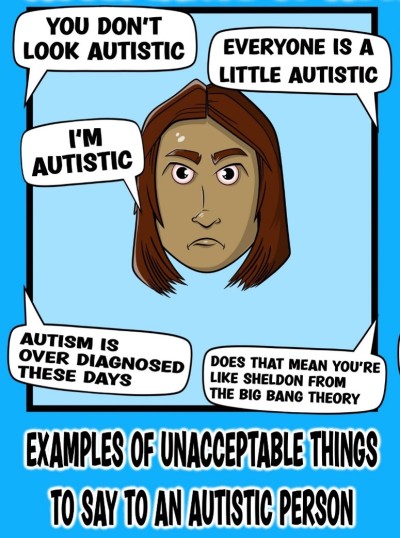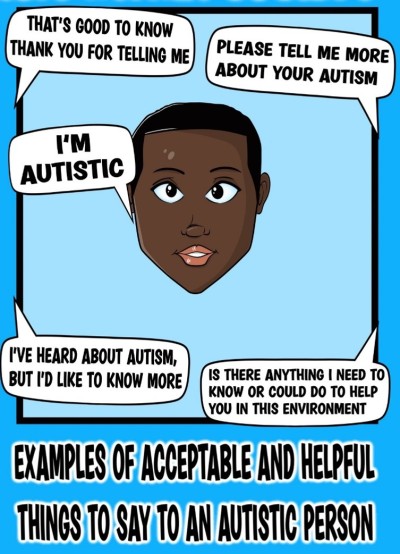Use the 'next' button to view the Autism Strategy page by page.
Aim one of our autism strategy is: 'Improving understanding and acceptance of autism within society.'

In this section we have included examples by Autistic Minds to help illustrate what is acceptable and unacceptable to say to an autistic person.
Later in this section we discuss:
- Themes, feedback and suggestions raised by people during our review
- Our commitments to deliver this aim
- How we will work towards our aim within CWP between 2022-2027
- How we will work towards our aim with partners between 2022-2027
Artwork by Helen’s Artsy Creations
|
Improving understanding and acceptance of autism within society |
|
|
Examples of unacceptable things to say to an autistic person:  "You don't look Autistic." |
Examples of acceptable and helpful things to say to an autistic person:  "That's good to know thank you for telling me." |
| David feels upset and frustrated, and unfortunately he has heard these types of comments too many times in social situations. It's left him feeling ignored and socially not accepted. | Sam feels that they have been heard and appreciated. This has left them feeling supported and understood. They now have the confidence to engage in more conversations in the social environment. |
|
Themes, feedback and suggestions raised by people during our review: |
|
Workforce development Comments received relate directly to the section under Theme 1 and were around:
Quality of service provision and delivery Repeating your story
Person-centred care
Complexity pathways to support described as complex and difficult to navigate Working with partners and stakeholders Individuals, families and carers described difficulty in finding out what services are available and how to access them |
|
Our Commitments to deliver this Aim |
|
Workforce development Please refer to our commitments under Aim 1: improving understanding and acceptance of autism within society. Quality of Service Provision and Delivery
Please note that we have aims under Theme 4 addressing the environmental needs for autistic people which relate to both community and inpatient settings. Working with partners and stakeholders We will work with partners across the system to identify people at risk of admission earlier and wrapping support around them. Working with commissioners, we will implement the government’s key worker programme for children and young people with complex needs in inpatient mental health settings. Where people are admitted, we will work with partners to facilitate timely, appropriate and safe discharge.
|
How we will work towards our aim within CWP between 2022-2027:
Workforce development
We will co-produce and co-implement a Training and Development Plan for Level 1 training – all our staff to be Autism Aware.
This will be achieved through organisational delivery of the national Oliver McGowan Level 1 training programme, following a co-produced collaborative review to ensure the training delivered meets our Level 1 requirements.
We will co-produce and co-implement a Training and Development Plan for Level 2 training – all clinical staff to be Autism Informed.
This will be achieved through organisational delivery of the national Oliver McGowan Level 2 training programme, following a co-produced collaborative review to ensure the training delivered meets our Level 2 requirements.
We will co-produce and co-implement a Training and Development Plan for Level 3 training – developing autism champions and specialists across our workforce.
This will be delivered in 3 ways:
- We will create an Autism Clinical Specialist and Training Lead working across the organisation, reaching into teams who are supporting autistic people with a targeted offer of training and support, relevant to their service experiences/ needs.
- We will develop dynamic Action Learning Sets to support teams, including exploration of the Kirk Patrick Model of Evaluation. This will help reinforce training / best practice through reflective practice.
- We will identify clinical staff and support them to complete postgraduate education such as the Post Graduate Certificate in Neurodevelopmental Disorders at Chester University.
Our Level 4 offer- will enhance and further develop the existing highly specialist roles within CWP in accordance with their job role and continuing professional development. This may include supporting access to specialist education such as Postgraduate Masters programmes or specific therapeutic intervention courses.
We will ensure these highly specialist experts continue to support the agenda of improving knowledge, practice, and culture within the organisation.
Quality of Service Provision and Delivery
We will use the digital flag in our Electronic Patient Record to highlight people with an autism diagnosis so that staff can clearly recognise that they are supporting an autistic person and can adapt their approach accordingly.
We will promote use of the Autism Hospital Passport which can be used to support autistic people accessing any hospital (community, acute or mental health).
To support staff learning, we will develop an autism hub intranet site filled with information about reasonable adjustments including our reasonable adjustment checklists.
How we will work towards our aim with partners between 2022-2027:
Working with partners and stakeholders
Through CANDDID, CWP already provides some on-line training for family members and unpaid carers (free to access), support workers and personal assistants and autism core training for Psychiatrists (Commissioned by Health Education England). We will build on this work with partners, identifying needs and funding streams so we can effectively deliver a range of co-produced on-line training and development modules which can be accessed easily. This will also support people waiting for a diagnosis.
CANDDID are already working with the North West Ambulance Service (NWAS) to enhance their staff training in relation to autism and intellectual disabilities and will extend this work to other crisis response organisations (e.g., police/ fire).
We will work with commissioners to identify funding to support ongoing training and development activities linked to the local crisis offers, including the Crisis Cafés across Cheshire and Wirral and staff at our Partner Hubs.